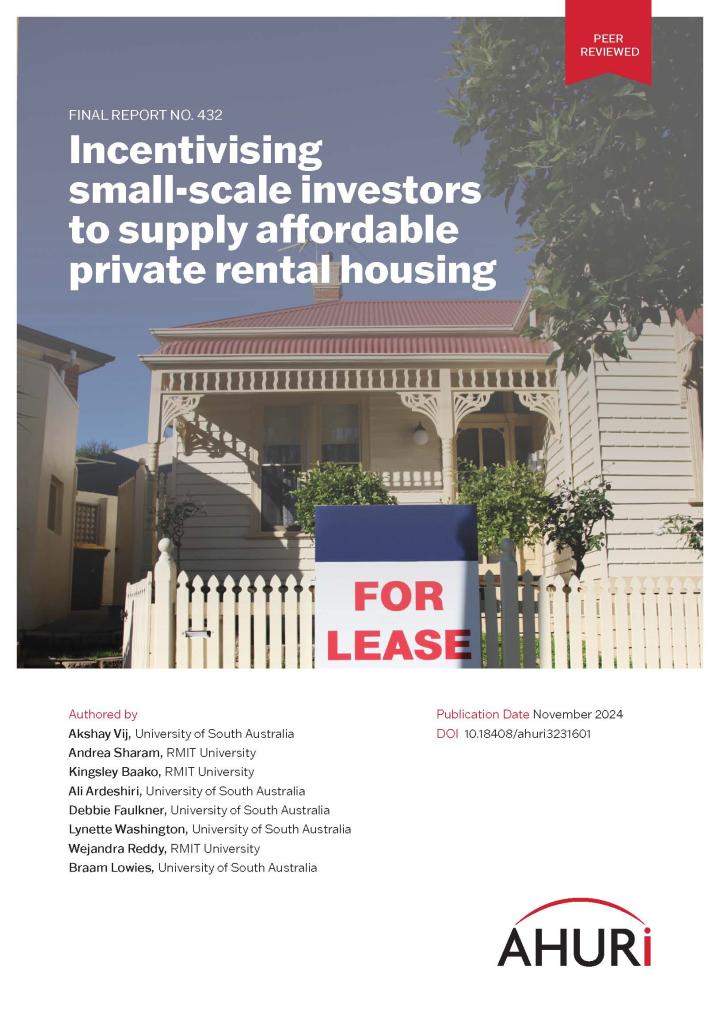
With the right incentives, ‘Mum and Dad’ landlords could help deliver affordable housing
21 Nov 2024
With 90 per cent of all property investors in Australia being small-scale ‘Mum and Dad’ investors, governments are keen for them to participate in providing affordable housing. New AHURI research has found that landlords who are participating in schemes that provide affordable housing are positive about their experiences. It also found that more landlords may be interested if they were aware of these opportunities.
The research was undertaken by researchers from University of South Australia and RMIT University, and examines how governments can best encourage small-scale landlords to provide rental housing that is affordable.
Small-scale housing investment operates in two business models
The researchers identified two main business models for small-scale landlords: the first model is the positively geared long-term hold investment and the second is the short-term hold for capital gain investment model.
‘Generally short-term landlords focus on capital gains and negative gearing to create their housing wealth,’ says lead researcher, Associate Professor Akshay Vij from the University of South Australia. ‘They prefer to buy newer, higher-value properties and, as a consequence, are not a significant source of affordable housing.’
‘Long-term hold investment’ landlords are happy to consider affordable housing schemes
‘However our research did find that landlords who use the long-term hold investment model were more open to affordable housing schemes - as long as such schemes allowed them to realise their required rate of return,’ said Associate Professor Vij.
‘This is the largest group of investors. They are moderate-income households that invest on the basis of being positively geared, which means they are cashflow-sensitive—particularly in the early years of their investment. In general, they purchase cheaper housing in lower value locations, providing a source of affordable rental housing, and are sensitive to the affordability issues faced by tenants. They don’t, however, drive the creation of new stock.’
Small scale investors need positive cashflow in affordable housing schemes
‘Long-term hold’ landlords are attracted to affordable housing schemes that maximise the potential for a positive cashflow—schemes that focus on capital gains, such as negative gearing and tax concessions, have less appeal.
They also value schemes that guarantee rental income. It is important to index rent increases to market rates so that investors who lock-in to long-term schemes are not discouraged.
Affordable headleasing programs very popular with knowledgeable landlords
All the landlords surveyed in the research who had participated in a headlease program were fully supportive of such programs. In a headlease program, social housing providers lease private rental accommodation at market rates and then sublease these properties to approved households at a reduced, affordable rate.
The advantages for landlords included guaranteed rental payments providing cashflow security; no loss of rent due to vacancy and no need to advertise for new tenants; and reduced administration demands. In addition, guaranteed make-good provisions provided confidence that the property would be returned to original condition.
Investors report good satisfaction with affordable housing schemes, but many lack awareness
Eighty-one per cent of investors who had engaged in affordable housing schemes found them satisfactory, and between 40 and 60 per cent of all landlords surveyed said they would be willing to participate in a scheme such as headleasing or the now closed National Rental Affordability Scheme (NRAS). Despite this, only 39 per cent of small-scale investors in the research sample (of 800 landlords) were engaged in affordable housing schemes, and generally there were poor levels of awareness of such schemes.
Educating landlords improves investment awareness
‘Many landlords were not financially sophisticated and tended to invest from a place of ‘sentimentality and informality’ rather than an objective assessment of investment risk and return,’ says Associate Professor Vij.
‘A coordinated national education program to increase awareness of affordable housing incentive schemes could improve participation. It could also improve financial literacy and filter out vulnerable investors before they enter the affordable housing market, thereby minimising disruption for tenants caused by financial overcommitment.’

